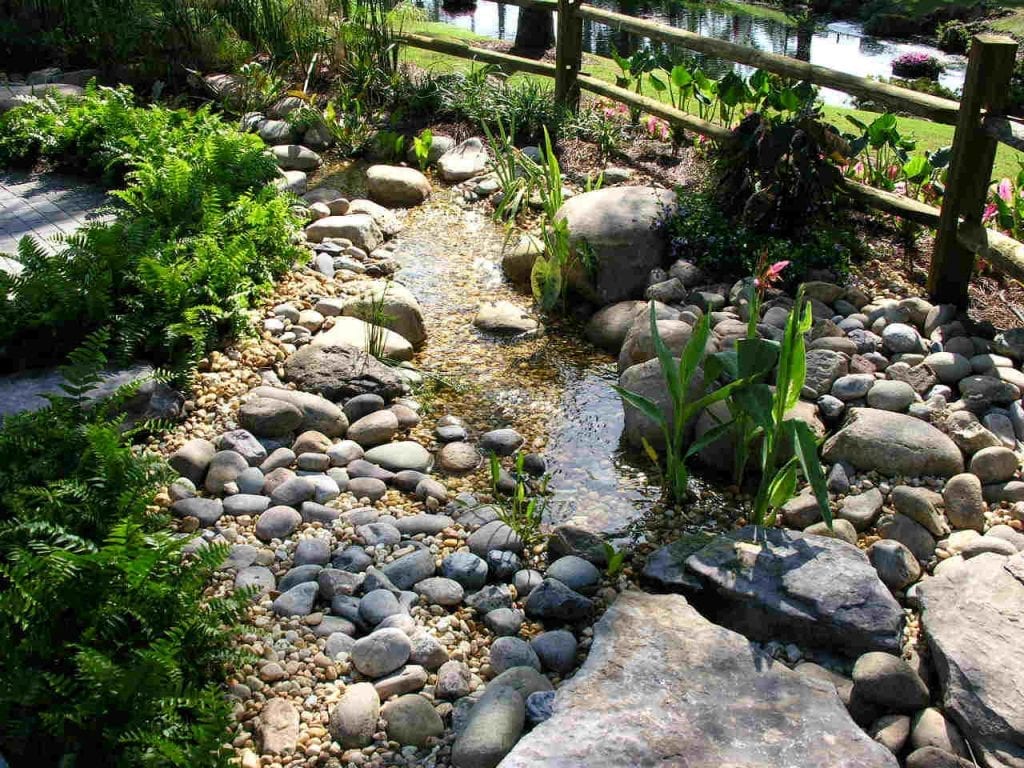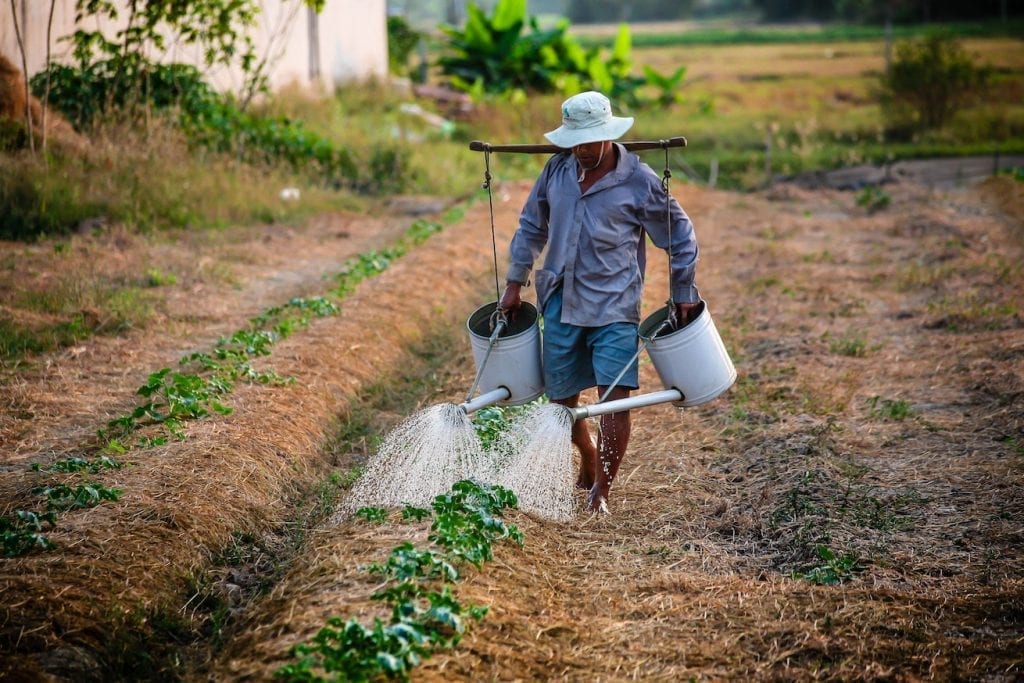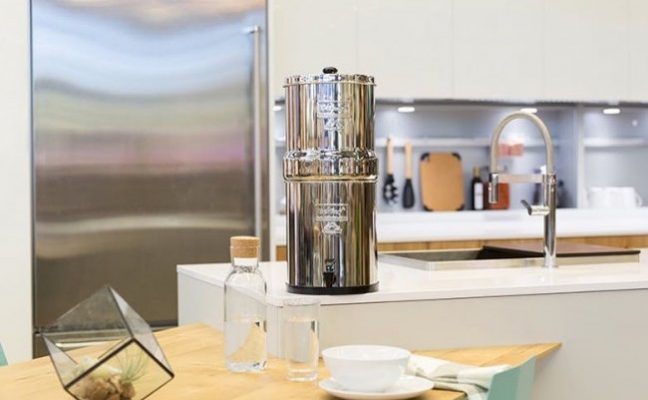Rainwater is the best resource for any homestead. Rainwater harvesting, directing, and storing rainwater for use later is a great way to be self-reliant as well as preserve a precious resource.
We all know that fresh water is a finite resource. The systems for preparing that water for irrigation and consumption are extensive, out of date, and sometimes even dangerous to our health. By directing rainwater or collecting it, you take some of the burden off those systems and you ensure the quality of the water you use for irrigation or, if desired, consumption.
The harvesting of rainwater is especially the case for those that are able to, and want to go, completely off-grid and this is a way to have access to water if you cannot access a well. As a part of homesteading, and basic preparedness, securing a sustainable water source is a tough challenge. Rainwater harvesting is a great strategy to ensure you can catch, store and use that water. You can also try salt water, but that’s for another post.
If you have heard of rainwater harvesting methods you know that there are many ways that this can be achieved. There are methods such as terracing, using cisterns, mulch basins and paving with natural materials. I have tried all of these and the most beneficial rainwater harvesting methods I have found are specifically to do with downspouts, which are easy and require very little work. The best methods for rainwater harvesting that I have seen produce the highest results are three different types of downspout systems such as fixed downspouts from the roof of a house, a downspout from a catchment structure in a garden, downspout and cistern from wide open areas, and of course, using earthworks to control the flow of rainwater for the garden.
Since these were the ones that gave me optimal rainwater catchment results, let’s take a closer look at those three downspout methods and the easy earthworks method.
Rainwater Harvesting Method #1 Downspouts
The simplest way is to put a splashdown style rain barrel beneath a downspout like what you see in the image below to feed a water supply for the garden.
Using a downspout system from the roof of a building is a very effective way of gathering large volumes of water that would otherwise go to waste. It is also very simple, just remember to place the rain barrel on a level surface elevated from the ground in order to create water pressure. We use different variations of this method at home as well as our urban farm.
It should be noted that with many types of rainwater harvesting methods, that the water needs to be filtered and processed if it is to be used as drinking water. For rooftop catchment systems, the rainwater will mix with a lot of the soot and dust and other bits that settles on rooftops, so filter those bits out and then use a purifying filter or boil the water.
How to stop one barrel from overflowing – Another type of rainwater harvesting barrel is one that diverts from a downspout. This can be a cleaner collection because the water goes directly from the downspout to the barrel without being exposed to debris (as long as your gutters are cleaned.
This method diverts the water from the downspout until the barrel is filled, any overflow proceeds down the downspout. You can link multiple barrels to collect more water.
Rainwater Harvesting Method #2 Catchment Structure
Another collection method is constructing a catchment structure. We constructed one on our urban farm and placed a 550-gallon tank (RomoTech) beneath it which has been a really efficient way of easily catching large volumes of rainwater, and storing it, so that it doesn’t overflow quickly and can hold a good reservoir for the garden and dry periods.
How we made this rainwater harvesting system – The construction was quite simple. We dug post holes and cemented in 4×4 treated lumber at varying heights to create a slope, then we installed 2×4 bracing lumber to create a roof structure and support. We chose PVC panels for the roofing material because they were economical, easy to cut to our specifications and light in weight so we could maneuver them into position.
We then attached them to the structure with screws and used a silicone sealant over the screw heads to ensure the roof was watertight. We then installed a gutter on the lower end of the structure to catch the rainfall as well as downspouts and tubing to carry the water to the large tank.
We also created a smaller roof structure over our beehives (below) that serves the dual purposes of shielding the bees from most of the rain and snow we get and to create a collection point for rainwater.

Rainwater Harvesting Method #3 Large Surface Collection
A more historic example of rainwater collection is at Thomas Jefferson’s mountain top home of Monticello. Located in Charlottesville, Virginia. The American President installed large and long promenades on both sides of his large residence to combat the shortage of water access (below).
These promenades served a dual purpose; to allow him, his family, and guests to stroll outside the home in safety and comfort and to provide a large surface area to collect and direct rainwater. Jefferson had collection troughs installed on either side of the promenades that diverted water to underground cisterns. This water was used throughout the estate for irrigation as well as for consumption.
Rainwater Harvesting Method #4 Earthworks
Aside from collecting rainwater, you can also direct it and contain it by modifying the way the land controls water flow. Swales, ditches, and berms have been used for millennia to divert, collect and use rainwater effectively.
This method of rainwater harvesting is a great way for small backyard gardens to have a nourishing amount of wet soil after rain. You can see in the image below where a garden uses a rock creek and feeds the surrounding plants with water.
According to the dictionary, swales are “a low-lying or depressed and often wet stretch of land.” Digging out small or large stretches of earth, and then planting things (often food bearing plants and or trees) at the edge of these stretches creates a natural irrigation method. Prior to powered irrigation systems; ditches and swales were used by many ancient cultures as a means to divert rainwater as well as river or lake water to their agricultural crops.
Examples of this are Native American settlement sites that show ditches dug from points of a river to flatter areas where crops were grown as well as archaeological evidence from ancient Egypt that tell of diverting the annual floodwaters of the Nile to irrigate fields of grain.
Swales and ditches can be very utilitarian or can also be a very decorative part of a landscape. Some people make a feature of a dry creek bed in their yards so that the swale is not only functional to direct rainwater, but also very pretty.
How to automate your farm watering off-grid
If you go the route of rainwater harvesting, once the rainwater is stored, the uses are nearly limitless. One of the primary uses of this water is for irrigation. During dry periods with little rainfall, this stored water can be used to irrigate food crops without relying on municipal water supplies.
The setup below is what we use on our urban farm to automate the sprinkler systems in our greenhouses and veggie patches. With the rainwater storage and rainwater catchment unit, this is essentially an off-grid automatic watering setup for the farm.
Water can be extracted from storage to watering cans or to irrigation systems. On our urban farm, we use a combination of hand watering and a home built solar-powered irrigation system to water our crops (as seen below).
From our cistern under our collection roof, we have a lead hose that connects to a small, 12 volt, 70 watt transfer pump. The pump is connected to a battery which is charged by a nearby renogy 100-watt solar panel kit.
From the transfer pump, the water then is diverted to different zones of the garden by way of a hose splitter. The water then travels to various areas of the garden where it irrigates the crops by way of drip and soaker irrigation hoses.
What are some other ways to use rainwater catchments?
Irrigation of food crops is one use for water collecting from rainwater harvesting, but it certainly isn’t the only use. Similar to grey water, the collected rainwater can also be used to water your lawn as well as your houseplants.
The compost heap – Harvested water can also be of use at your compost heap. Periodic watering of a compost pile is essential to keep the aerobic process of breaking down garden and food scraps to rich, beneficial compost.
Water for animals – Fresh, clean, unchlorinated water is the best water for animals to consume. We use rainwater to provide our bees with drinking water all over our home garden as well as our urban farm. We use it to fill bird baths, a small, inground pond and smaller bowls and troughs where birds and bees and other creatures can sip safely. We also use collected rainwater for our chickens; they are better served with untreated water.
Washing – Collected rainwater can also be used for many tasks around the home or homestead. Harvested water can be directed to laundry facilities. The unchlorinated water can reduce wear and fading of dyed fabrics.
Trees – The resulting gray water can then be used to irrigate decorative trees and bushes around your property.
Showers and toilets – A handy person could re-direct the flow of water to bathtubs as well as toilets to use rainwater to bathe or to use for flushing the toilets. Some off the grid homes filter all the incoming rainwater and then store it in a small pressure tank. They then split the water into two separate paths – one path for potable (sanitized) and the other for non-potable water (un sanitized). A purification process is added to produce potable water.
This system has the advantage that it requires a much smaller unit and costs less, since it treats less water than a whole-house unit. The downside is that it requires a dual plumbing system – one to supply filtered but non-potable water to the toilets, clothes washer, irrigation faucets, etc., and one to supply potable water to the faucets.
This would be a great system to install as one is building a homestead but would be more difficult to retrofit.
Using rainwater as drinking water
The modern human digestive system, immune system, and for those in the US, the Environmental Protection Agency requires that water that will be consumed be made filtered and purified. This means the water must be treated in some way to sanitize it enough to be consumed, either directly or when used for cleaning vegetables or cooking them.
Before attempting to use rainwater for human consumption, it is important to test the collected water for environmental toxins, bacteria, pathogens as well as mineral content and particulate ratios. This will determine if you can reasonably purify the water for consumption and will inform you of the system or method that you can employ.
Is rainwater harvesting illegal? – This is a bit of a rumor that has spread on social media, however, many local governments encourage rainwater collection. In fact, in some places, such as Ohio, for instance, the local government offers rebates on rainwater collection barrels and tanks.
However, you will find that rainwater collection is a regulated practice, as it is something that can cause harm to nature if overdone, or to yourself. So be sure to check up on the laws in your local area here to see what those regulations are.
How to filter rainwater
There are many methods and stages of filtration and purification. The first is tight screening filtration as the water is collected so roof debris, grit, sand, or dirt is eliminated before the water is stored.
The cheapest way of purification once the water is stored is to add chlorine. For disinfection purposes, 2.3 fluid ounces of household bleach must be added per 1,000 gallons of water. Chlorine dosage rate will vary depending on the quantity of water to be treated, pH and temperature.
Once purified, it should go through a filter to eliminate the chlorine and other sediments. Faucet filters, as well as pitcher filters such as Zero Water or the Big Berkey Filter, will eliminate chlorine as well as other particulate matter from the water.
Various systems can also be purchased and installed in a home to purify rainwater. They employ various means of filtration and sanitation. Some systems expose water to intense ultraviolet light after filtration to purify the water. It is important to understand the amount of water and the light rate in each system and match it to the content of your collected water to ensure sanitation. Entry-level units will handle about 10 gallons per minute. The price of the unit will increase as options and flow rates increase.
Another filtration/purification system is what is called membrane filtration and involves pushing water through a layer of material under pressure. There are some subcategories of technology in this type of system. Pressure-driven membrane technologies include microfiltration (using a pore size of .03 to 10 microns), ultrafiltration (a membrane separation process using a pore size of approximately .002 to .1 microns), nanofiltration (an approximate pore size of only .001 microns) and reverse osmosis(filters to .001 microns). Reverse osmosis filter systems are the most compact and easily installed of the membrane filtration systems.
These systems can be quite costly to install and maintain and are not the “greenest” of solutions as they produce both byproducts, the particulate, bacterial, viral and mineral content that has to be managed (by changing and disposing of filters) as well as wastewater (water that cannot pass through the filter). Technologies are changing in this field to produce less waste, but they will always produce at least some.
At the top of the pile of purification processes is distillation. The process of distillation heats the water to boiling and then collects the condensation, thereby separating the water from the impurities.
This process is very energy intensive and loses about 5-10% of the water due to evaporation. The only contaminants that remain in the rainwater are volatile organic chemicals (VOCs) that evaporate easily. Therefore, some manufacturers of distillation systems include a final carbon filter to remove the VOCs.
A distillation system can run upwards to $4,000 and also uses electricity to heat the water and run the system so it is not the greenest of solutions either. However, there are some countertop water distillers that are coming onto the market that are much more affordable, such as the Megahome Countertop System.
It is important to do your homework before investing considerable effort and money into one of these systems, but they can be good tools to better use captured rainwater.
Rainwater harvesting is free and necessary
Fresh water is a finite resource on Earth. The amount of fresh, clean, contaminate free water is scarce. Many factors determine our access to this resource. The effects of climate change such as drought, globalization, corporate greed, and legislation impact our access to fresh water.
It is more important than ever to reduce our reliance on corporate and municipal sources for water. The municipal systems across the globe are aging and can be damaged easily. Corporate giants are gobbling up fresh water resources to purify and sell back to us.
By diverting rainwater or by collecting it and using it for agricultural, household, animal, and human consumption we protect the environment, use its resources sensibly and we also take back a resource that is rapidly being co-opted and taken from us.








